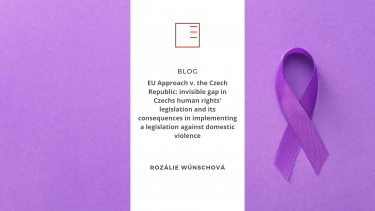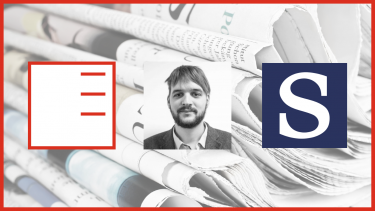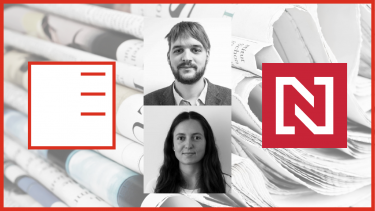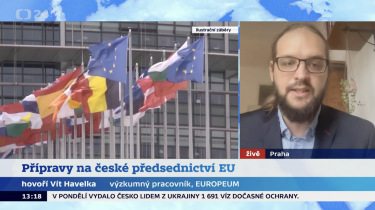Policy Paper | 2022 Czech Presidency: A Surprising Success
The second-ever Czech presidency of the EU Council took place in the second half of 2022, a period in which the EU was under considerable pressure following the Russian invasion in Ukraine. What many predicted would be another regular presidency, became half a year of crisis management. Writes Vít Havelka in his Policy Paper called: 2022 Czech Presidency: A Surprising Success.
Show more
Policy Paper | 2022 České předsednictví: Překvapivý úspěch
Historicky druhé české předsednictví v Radě EU se uskutečnilo v druhé polovině roku 2022, tedy v období, kdy byla EU pod značným tlakem v důsledku ruské invaze na Ukrajině. Z toho, co mnozí předpovídali jako další řádné předsednictví, se stal půlrok krizového řízení. Píše Vít Havelka ve svém Policy paperu nazvaném: České předsednictví 2022: Překvapivý úspěch.
Show more
INVITATION | Shaping our Digital Future: Tackling Disinformation in the EU, case of Central and Eastern Europe
We cordially invite you to the conference entitled Shaping our Digital Future: Tackling Disinformation in the EU, case of Central and Eastern Europe. The conference will take place on Monday 27 March from 16:30 to 18:45 at the Thon Hotel EU, Rue de la Loi 75 1000 Brussels.
Show more
BLOG: EU Approach v. the Czech Republic: invisible gap in Czechs human rights' legislation
Rozálie Wünschová writes in her blog that the Czech Republic is one of only two EU countries where corporal punishment of children is still legally permitted. Together with Slovakia, this puts the Czech Republic behind not only the Nordic countries, where corporal punishment was banned in the last century but also countries such as Turkmenistan, which adopted protective legislation in 2007.
Show more PDFSUMMARY OF EXPERIENCES WITH THE INVOLVEMENT OF CSOS IN V4 IN THE DECARBONISATION PROCESS
The project is focused on the examination of the role of non-governmental organizations in the process of decarbonization of coal regions in V4 countries (Czech Republic, Hungary, Poland, Slovakia). The aim of the project is to describe the best and worst practices of the individual processes for Serbia, who awaits the transformation of its energy mix, largely based on coal. The examined V4 countries have had a slightly different share of coal in their energy mix, while the largest one being in Poland and the second largest one in the Czech Republic, followed by Hungary and Slovakia. There are many similarities and differences in their takes on decarbonisation, thus providing different range of experiences.
Show more PDF

Blog | Business-as-usual between Germany and China as a disruptive element for the European Union
The war in Ukraine and the subsequent economic crisis caused by Europe's dependence on Russian fossil fuels showed Europeans the danger of keeping too tight economic ties to autocratic regimes. However, while Europe is shedding its dependence on Russia, another economic reliance is gaining strenght, namely that of Germany on China. In her blog, our intern Kristina Kropáčková explores the broader context of this phenomenon and its implications for EU cohesion.
Show moreBlog | "Business-as-usual" mezi Německem a Čínou narušuje soudržnost Evropské unie
Válka na Ukrajině a následná ekonomická krize, způsobená závislostí Evropy na ruských fosilních palivech, ukázala Evropanům, jaká nebezpečí skýtají příliš úzké ekonomické vazby na autokratických režimech. Zatímco se však Evropa zbavuje své závislosti na Rusku, jiná ekonomická závislost sílí, konkrétně ta Německa na Číně. Naše stážistka Kristina Kropáčková se ve svém blogu zabývá širšími souvislostmi tohoto fenoménu a jeho důsledky pro soudržnost EU.
Show moreLE SOIR: We are fighting about four hundred kilometres from the Czech border, so the war will take priority.
Vít Havelka, Senior Research Fellow at the EUROPEUM Institute for European Policy, was interviewed by the Belgian daily Le Soir. In particular, he discusses what is the main priority of the Czech Presidency, how it will be reflected at the European level and what will ensure the success of this Presidency.
Show more
Deník N: An explosive passenger is already waiting for the Czech train driver: how we will drive the EU legislative train
Our senior researchers Kateřina Davidová and Vít Havelka provided comments for an article in Deník N on what the government is facing and what role the presiding state has in the development of EU legislation.
Show more

ČT24: Preparations for the Czech EU Presidency
Vít Havelka, a research fellow at the Europeum Institute, spoke on ČT24's Studia programme about preparations for the Czech EU Presidency, which begins in July. Havelka's main focus is on the change in the role of the presidency from 2009. Now it is mainly about negotiating new European legislation than it was before. Furthermore, he also presented the direction of the Czech Republic in the legislative process and mentioned political priorities, where one of the main topics will be the war in Ukraine.
Show more
Staroměstské náměstí 4/1
Prague 1 - Staré Město
110 00
tel.: +420 212 246 552
email: europeum@europeum.org
https://www.europeum.org








